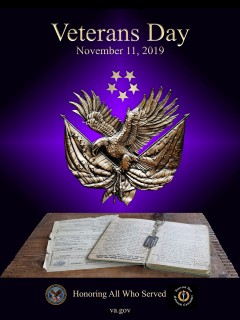For this post, I've focused on PTSD (Post Traumatic Stress Disorder) in Veterans, in recognition of Veterans Day (annually recognized on November 11th). Veterans Day honors America's veterans "for their patriotism, love of country, and willingness to serve and sacrifice for the common good."
Post Traumatic Stress Disorder is certainly not "only" an issue for Veterans; it has potential to occur to anyone who have been affected by trauma or traumatic events. Those who have experienced life-threatening or terrifying events like being in combat, surviving a natural disaster, being a survivor of domestic violence, sexual assault or sexual abuse, or even experiencing a horrific car accident may find themselves reliving the event (flashbacks) and having nightmares. They might feel very on edge, anxious or hyper-vigilant. Changes in thinking and mood are often observed, as is change in emotional or physical reactions. There may be guilt, sleeplessness, irritability, negative thoughts, avoidance of talking about triggers or feelings of numbness. Substance abuse and addiction may surface. Suicidal thoughts and attempts may occur.
PTSD is a mental health issue of which can be treated but first must be recognized.
According to We Who Honor Veterans (wewhohonorveterans.org), "...after the event, the Veteran may feel scared, confused, or angry. If these feelings don't go away or they get worse, the symptoms may disrupt the person's life, making it hard to continue daily activities. All Veterans with PTSD have lived through a traumatic event that caused them to fear for their lives, see horrible things, and feel helpless."
The symptoms can be invasive, profound and painful. Daily life can be greatly interrupted. Feeling of shame may bubble to the top, interfering with the thought of getting help. Asking for help is tough and too often seen as a weakness. Soldiers are tough, not weak. For this reason, there is potential stigma in seeking treatment.
The Wounded Warrior Project (https://www.woundedwarriorproject.org/) notes, "...these are the wounds that don't break the skin; they are hard to reach, hard to treat, and hard to heal... wounds that wake you up at night in a sweat, that leave you feeling helpless and alone... that don't break the skin, but break the heart, spirit, and mind of a soldier." ~Yolanda Poullard, https://newsroom.woundedwarriorproject.org/warrior-stories?item=31055
Mental health treatment for veterans with PTSD can make a profound difference. Trauma-informed treatment, cognitive behavioral therapy, Eye Movement Desensitization and Reprocessing (EMDR) and even virtual reality are used as means of help of reducing symptoms of PTSD.
The key to success? Finding the right therapist with the approach which works for you. What works for one vet might not work for another. It makes sense that working with someone understands what it means to be a veteran, to be someone who experienced combat or has experience working with veterans. If substance abuse has become an issue, substance abuse treatment might make sense. If the vet is comfortable talking to a therapist, that might be the avenue of choice. Groups often help with stigma related to being a vet with PTSD. At times, medication for depression or anxiety might be considered by a medical professional.
There are many excellent websites regarding PTSD in veterans. All it takes a search engine and an eye for information that is current, specific to the topic and of interest to learn more about symptoms and treatment of PTSD in vets. Everyone is different; hence, what website is helpful to you might not be helpful to someone else.
A great reference for Veterans who present with symptoms of PTSD is "Understanding PTSD and PTSD Treatment" (National Center for PTSD, May 2019). You can get a free copy at https://www.ptsd.va.gov/ publications/print/understandingptsd_booklet.pdf It's a great place to "start" for vets and those who love them.
Another excellent website specific to veterans with PTSD is: National Center for PTSD, found at https://www.ptsd.va.gov/
Thank you to Veterans for serving our country. There is help for PTSD. It takes great strength to ask for help, to seek treatment. Please take care of yourselves. Ask. You're worth it.
*********************************************************************************************************************
In no particular order…from a rudimentary Google Search. There is a LOT of information out there. Good luck with your search and may you find peace and relief from your symptoms of PTSD.
https://www.ptsd.va.gov/professional/treat/type/PFA/VA_NCPTSD_ALL_508.pdfConnecting with Others: Seeking Social Support
https://www.stress.org/tips-resources-for-helping-veterans-with-ptsd
https://maketheconnection.net/conditions/ptsd
https://americanaddictioncenters.org/trauma-stressor-related-disorders/combat-veterans
https://www.military.com/benefits/veterans-health-care/ptsd-treatment-options.html
https://www.thisableveteran.org/
https://www.thisableveteran.org/our-dogs/
https://www.nami.org/find-support/veterans-and-active-duty
https://www.verywellmind.com/rates-of-ptsd-in-veterans-2797430
